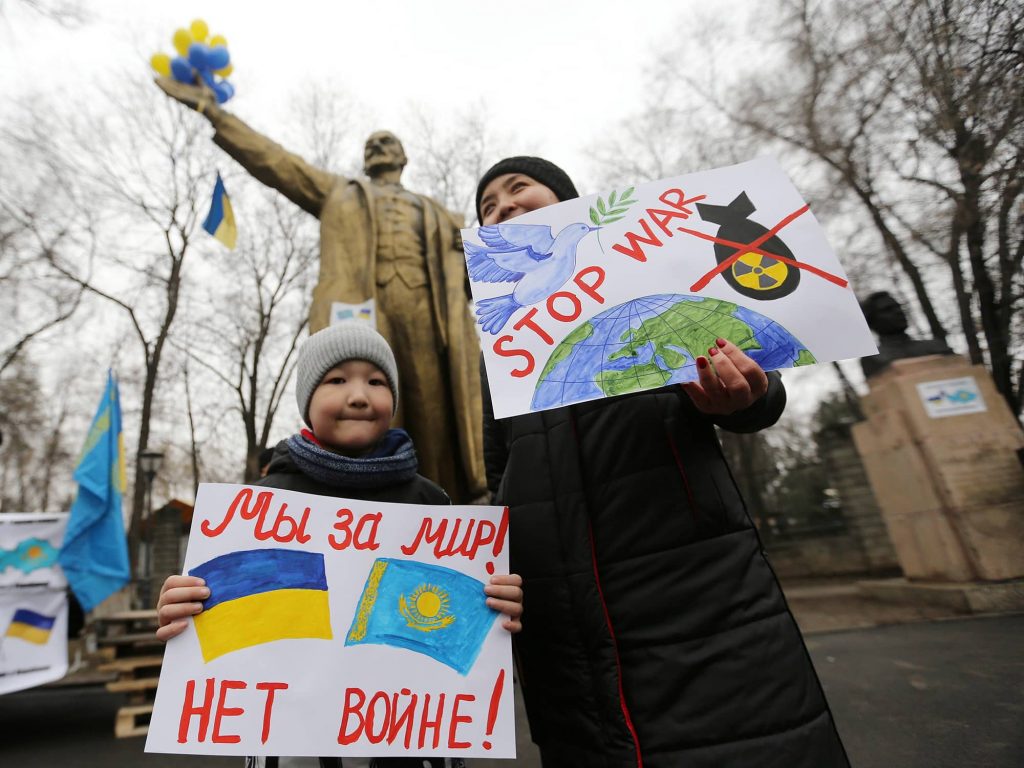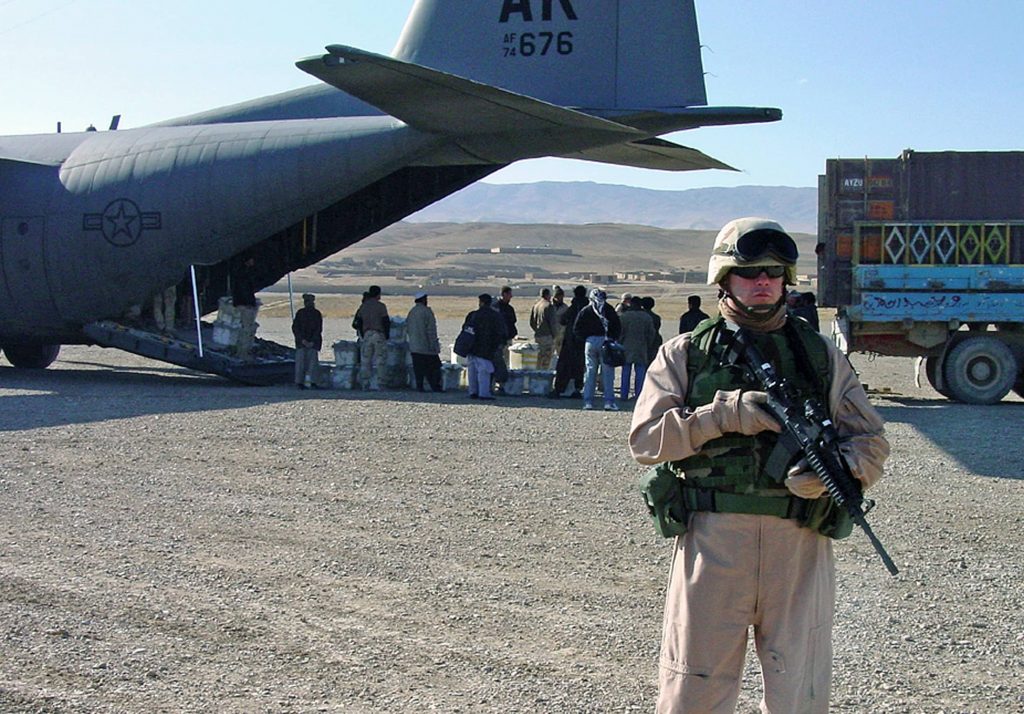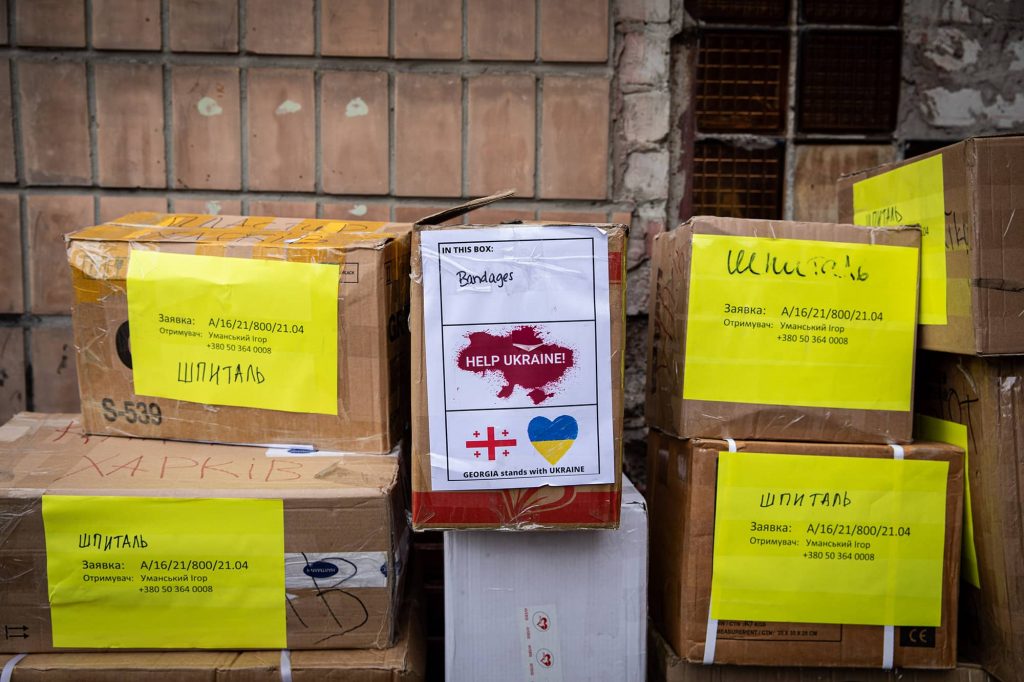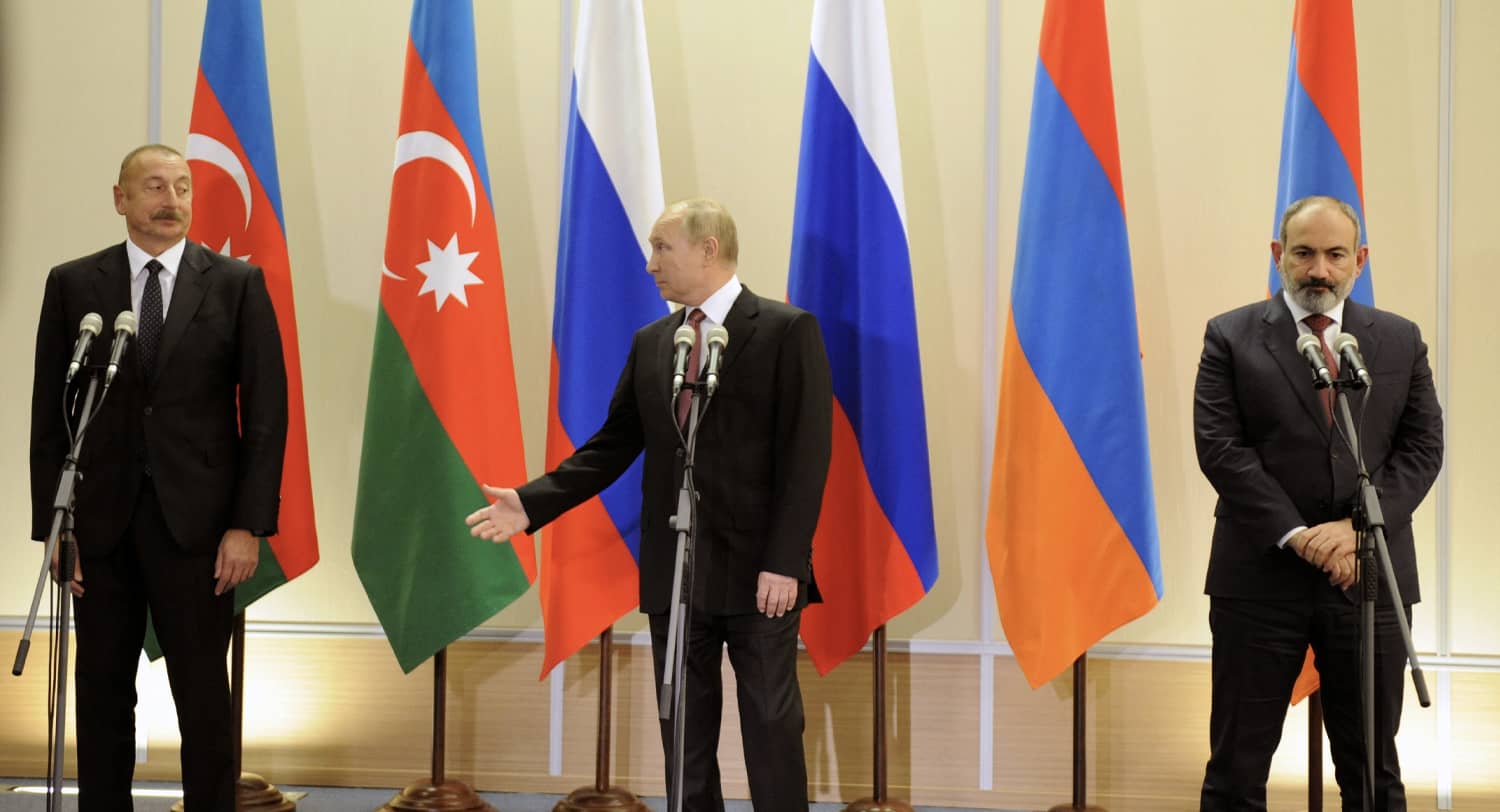Russian President Vladimir Putin’s unprovoked war against Ukraine has certainly shocked the world, but it should not really have come as a great surprise. From his very first term in office at the beginning of this millennium, Putin declared the now independent former Soviet Socialist Republics to be “Russia’s special sphere of influence.” Occasionally, he escalated his wording and has called them “Russia’s exclusive sphere of influence.”
The United States has always rejected this posturing. US policy from the beginning supported the sovereignty, independence, and territorial integrity of all these new nations. Eight of them belong to the Caspian region, which includes the South Caucasus (Armenia, Azerbaijan, Georgia) and Central Asia (Kazakhstan, Kyrgyzstan, Tajikistan, Turkmenistan, Uzbekistan). They must walk a very fine line in not antagonizing their large, aggressive northern neighbor while taking steps to align with the West and support Ukraine.
Ever since the breakup of the Soviet Union, an interesting anomaly emerged—directly related to the Ukraine catastrophe: the existence of the so-called “frozen conflicts,” sometimes termed “prolonged conflicts.” These were usually break-away areas of the new countries that sought their own independence or reunion with Russia or, at a bare minimum, sought to redefine the borders that the Stalin government had drawn in the early years of the Soviet Union. These conflicts often had originated historically because of ethnic disputes and included Nagorno-Karabakh in Azerbaijan but claimed by Armenia; Abkhazia and South Ossetia in Georgia; Transdniestria in Moldova; and Donetsk and Luhansk in Ukraine. Each of these conflicts is unique, and each has its own historical precedent.
Kazakhstan has its own border tension with Russia, although it doesn’t rise to the level of a conflict zone like the others above. Putin, among other Russian politicians such as the late Vladimir Zhirinovsky, often claimed the northern third of Kazakhstan as an historic part of Russia, causing President Nursultan Nazarbayev in the mid-1990s to move his country’s capital from Almaty to the rust-bucket city of Tselinograd on the largely empty steppe of north-central Kazakhstan. As an interesting historical footnote, this isolated city was historically known as Akmola (“white grave”) before the Soviets named it Tselinograd. Nazarbayev named it Astana (“capital” in the Kazakh language); once he semi-retired, it was renamed Nur-Sultan after Nazarbayev’s first name. He confirmed this reason for the move to me personally—“to plant our flag firmly in the north”—in one of our conversations when I was US ambassador to Kazakhstan, from 2008–2011.

Protest in support of Ukraine, in Almaty. Photo credit: REUTERS
What Putin is now doing in Ukraine is really a scaling up of a major move that he had previously tested. In 2008, Russian military forces invaded South Ossetia in Georgia. They remain there to this very day, slowly inching their way deeper and deeper into the sovereign territory of Georgia itself. In 2014, as is well known, Putin annexed Crimea from the sovereign territory of Ukraine, blandly claiming that he was simply rectifying an historical mistake that Nikita Krushchev had made in the 1950s. And then, as a co-chair of the Minsk Group of the Organization for Security and Cooperation in Europe (the other co-chairs were France and the US), Russia brought the 2020 war between Armenia and Azerbaijan to a halt before Azerbaijan had fully reclaimed its sovereign territory of Nagorno-Karabakh and the surrounding areas that Armenia had occupied since independence. While some saw this as a positive move to stop the death and destruction, others suggested it was the Kremlin’s desire to keep this “prolonged conflict” alive.
Why did Putin not work to solve these prolonged conflicts? He seeks to prevent the potential moves of these countries toward membership in NATO and, in the case of Georgia and possibly Armenia, membership in the European Union, even though Yerevan remains generally aligned with Moscow and hosts a Russian military base in Armenia that ostensibly protects it against its perceived “enemy neighbors,” Turkey and Azerbaijan.
Russia’s war against Ukraine has now put the Caspian countries in a quandary, in part because each, in its own way almost since independence, has practiced a multi-vector foreign policy seeking to maintain their fragile independence through a balance in their relations with Russia, China, the EU, and the US. But each in its own way is now appalled by the war in Ukraine, while Moscow continues to tell them: “You must stand with us!” Each, in its own way, is seeking to take steps to move closer toward the West in ways that would not automatically trigger Russian retribution. US foreign policy continues its rote repetition that the US supports their sovereignty, independence, and territorial integrity. But at the same time it keeps them, to a degree, at arm’s length. Why?
The reason goes back to the very beginning of their independence when Washington, in a spasm of irrational exuberance, fully expected that the new, independent nations of the disintegrated Soviet Union were naturally yearning to breathe free and would become free-market democracies aligned with the West. At the urging of the administration of George H.W. Bush, the US Congress quickly passed the 1992 FREEDOM Support Act (FREEDOM is one of those quirky Congressional acronyms that stands for “Freedom for Russia and Emerging Eurasian Democracies and Open Markets”) that provided generous funding for both civilian and military assistance programs to get these new countries firmly on their feet. And within a year of their independence, Washington had opened new embassies in every single one of these new countries.
But history didn’t move in the way that Washington had expected. These new countries did not quickly become free-market democracies seeking to align themselves fully with the West. In fact, they began to develop reputations for human rights abuses, economic manipulation by the ruling-elite families and their cronies, and generally fell short of Washington’s view of “good governance,” including, for most of them, a lack of free and fair elections.
In retrospect, this should not have been overly surprising. These post-Soviet new countries do not share in the Western political traditions that grew out of the Renaissance, Reformation, and Enlightenment. They experienced 70 years of the Soviet Empire, several hundred years of the Russian Empire before that, and their own even earlier traditions as parts of the Ottoman and Persian Empires. Before that, especially in Central Asia, they were Mogul khanates in the traditionally settled areas and nomadic societies elsewhere. Their “modern traditions” gained under Soviet and Tsarist Russia go directly back to the Byzantine Empire and the Eastern Orthodox Church, quite distinct from the West. And so it’s somewhat unintendedly ironic when today those in the capitals of the West scratch their heads and comment that these countries can sometimes be quite byzantine.
One of the best ways to understand these countries’ relations with the West is to examine what they did—or, more precisely, how they worked closely with the US during Washington’s two-decade experience in Afghanistan. After 9/11, Washington developed a reality-based relationship with the five Central Asian countries and Azerbaijan because it needed their help in the war in Afghanistan. In the weeks following the 9/11 terrorist attacks , the US government quickly negotiated access to an old Soviet military base in Uzbekistan, Karshi-Khanabad, and to the Manas International Airport just outside of Bishkek, Kyrgyzstan, and not very far at all from the Russian airfield at Kant in Kyrgyzstan. What’s little known is that President Putin, at that time, gave his blessing to these “temporary” US military facilities. Specifically, he told the leaders in those countries to allow them because it was in Russia’s interest to see international terrorism defeated in Afghanistan.

US soldier guarding shipment in Karshi-Khanabad Air Base in Uzbekistan, 2001. Photo credit: REUTERS
Two other aspects of how Central Asia was willing, even eager, to support the US military in Afghanistan, can now be made public. One is that Washington had originally planned three temporary military facilities, the third being in Tajikistan. But when US Secretary of Defense Donald Rumsfeld made the final location decisions, he judged that two would suffice. The other is that “permanently neutral” Turkmenistan made the international airport at Ashgabat available to the Pentagon for transit and refueling operations. However, this came with the proviso that this cooperation had to remain secret and that any US military members serving there were never permitted to appear in uniform—civilian dress was required at all times.
Central Asia initially helped the US war effort in Afghanistan by opening its borders to what was known as the Northern Distribution Network, a transit network for non-lethal goods and supplies for the US and NATO militaries from Europe through Russia (of course, with the Kremlin’s approval), across Central Asia, and into Afghanistan. When Russia shut this down after several years, Azerbaijan stepped up and became not only a transit point but also supplied a significant amount of aviation and other sorts of fuel for the US and NATO military operations in Afghanistan.
Although these countries were significantly helpful to the US in Afghanistan, to the degree that Putin allowed, now—when they now need supportive attention from the West—Washington continues to keep them at arm’s length. During the current war in Ukraine, Washington has focused its public attention on Central Europe, sending high-level visitors to show visible support: Secretary of State Antony Blinken, Secretary of Defense Lloyd Austin, and First Lady Jill Biden. The highest-level visitor to any of the Caspian countries as of mid-May is Under Secretary of State Uzra Zeya. And you can be sure it did not go unnoticed in those capitals that a key part of her portfolio includes democracy and human rights.
I’ve gone into some detail about the support the Caspian region countries gave to the US and NATO operation in Afghanistan during the first two decades of this century to illustrate that these independent nations are willing to work with the West and are not passive pawns that Putin believes he has the exclusive right to move around on his chess board. At the same time, however, these countries, as appalled as they might be by Putin’s savagery in Ukraine, have to walk a very, very fine line. They cannot overtly support Kyiv, but they are finding ways to make their views clear without, they hope, bringing down upon themselves the wrath of the Kremlin.
Votes at the UN tell part of the story. On March 3, 2022, UN members voted on a resolution demanding that the Kremlin immediately end its invasion of Ukraine. Armenia, Kazakhstan, Kyrgyzstan, and Tajikistan abstained; Azerbaijan, Turkmenistan, and Uzbekistan did not vote at all. Only Georgia voted in favor of the resolution. When a resolution was proposed in the General Assembly to suspend Russia from the UN Human Rights Council, Kazakhstan, Kyrgyzstan, Tajikistan, and Uzbekistan cast their votes against the resolution, while Armenia, Azerbaijan, and Turkmenistan were not recorded as having voted. Only Georgia, once again, voted in favor of the resolution. But these highly publicized UN votes do not tell the whole story of where the Caspian countries really stand.

Medical supplies donated from Georgia in Kharkiv, Ukraine. Photo credit: Alex Chan Tsz Yuk / SOPA Images/ via Reuters Connect
One thing that they have done is open their doors to dissident Russian citizens who have chosen to flee their country as a result of the war. Mainly highly skilled professionals like IT specialists, educators, journalists, and civil-society leaders who strongly oppose the current war and fear for their own futures in an increasingly totalitarian state have flocked to cities like Almaty, Baku, Tbilisi, and Tashkent in large numbers, causing a shortage of apartments and soaring prices in rental markets. This is the opposite of what happened soon after the break-up of the Soviet Union when ethnic Russians in these newly independent countries fled to Russia because of uncertainty about their futures, were they to stay. It’s also worth remembering that a large number of Jewish citizens of the former Soviet Union immigrated as soon as the Soviet-era restrictions disappeared. This was especially evident in Uzbekistan where the vast majority of the Bukharan Jewish community immediately packed their bags and moved with their families to Israel and New York City. Today, Bukhara, which once was home to at least 80,000 Jewish citizens, now has fewer than 100, mostly elderly. The synagogue in the old city of Bukhara remains open but is served only intermittently by visiting rabbis.
Even though the Caspian countries rarely overtly criticize the Kremlin’s war in Ukraine, they are clearly appalled and fear what might face them in the future. And so to concretely demonstrate their concern for their brothers and sisters in Ukraine, they have provided humanitarian assistance. In March, at the request of Ukrainian President Volodymyr Zelenskyy, Kazakhstan sent medical supplies and equipment valued at $2.2 million. Shortly thereafter, Azerbaijan dispatched $5.9 million worth of medical supplies and personal-care products to Ukraine. Further, the leadership in Baku ordered Azerbaijan’s state oil company, SOCAR, to provide free fuel for ambulances and other emergency vehicles in Ukraine. Very soon thereafter, Georgia commissioned a large shipment of humanitarian assistance for the Ukrainian people. Uzbekistan followed suit early in April, sending 34 tons of medicines, first-aid kits, and food to the Zakarpatska region in western Ukraine for onward distribution among the suffering citizenry.
By welcoming refugees from Russia and dispatching non-lethal assistance to their Ukrainian brothers and sisters, the Caspian countries are making clear where they really stand. In a single word, they are appalled by the Kremlin’s unprovoked attack and wanton destruction. They are doing what they can while hoping not to provoke the northern bear. Therefore, it is in the interest of the US and other Western nations—as well as countries like South Korea and Japan with significant interests in the region, especially in Central Asia—to give visible, high-level support to the countries of the Caspian region. They deserve our acknowledgement of their carefully calculated support of Ukraine because they are, indeed, walking a very, very fine line.

